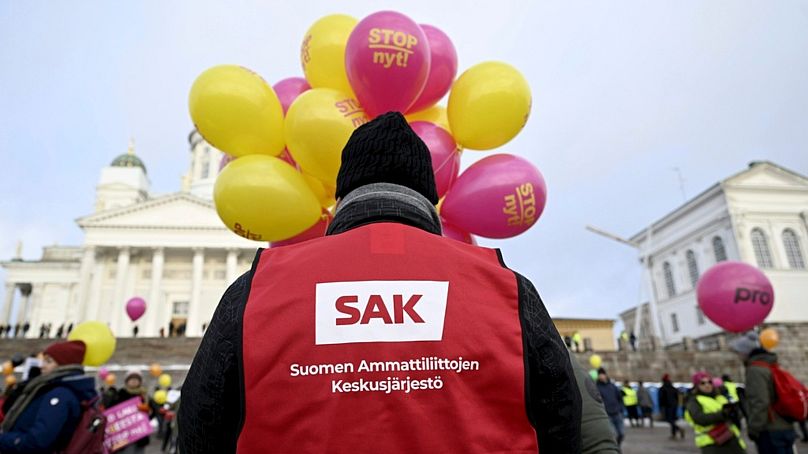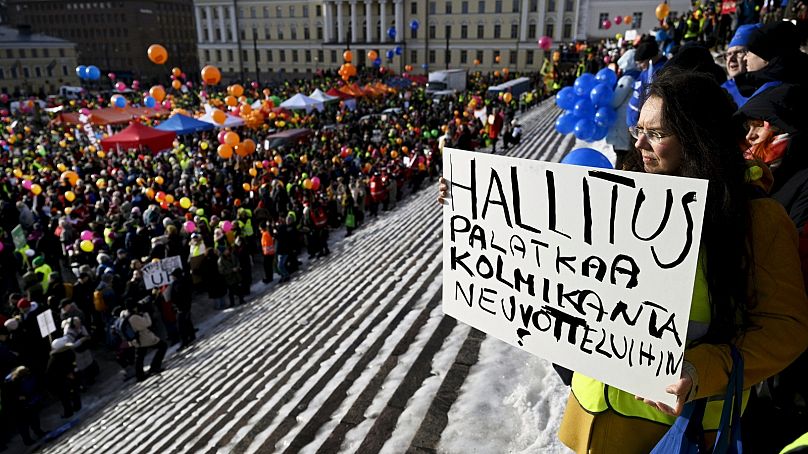Unions have called the industrial action to protest government proposals on labour law reforms which they say would adversely impact low-wage earners
Hundreds of thousands of workers in Finland have joined widespread strikes which began Wednesday and will escalate through Thursday and Friday - with more strikes planned next week too.
 ADVERTISEMENT
ADVERTISEMENT
 ADVERTISEMENT
ADVERTISEMENT
Unions called for industrial action to protest government proposals on labour law reforms which they say would adversely impact low-wage earners and shift a balance of power towards employers when it comes to setting salaries.
A rally in the capital Helsinki attracted 10,000 workers, police said. A member of parliament from the ruling National Coalition Party wrote on X, formerly Twitter, that protesters had been paid "bribes" to attend. He offered no evidence to substantiate his claim.
The strike comes right in the middle of campaigning in the second round of Finland's presidential election, with politicians from the left and right canvassing hard for votes ahead of the ballot on Sunday 11 February.
The government maintains that their sweeping reforms are needed to make the Finnish economy more competitive, and as an indicator of how important the new proposals are to each side, the rhetoric has become more heated and divisive in recent weeks.
"The need to reform our social security system and increase employment is urgent because of our public debt level. We need to get more people to work, decrease public spending and improve the operating environment to attract investments," says Arto Satonen, Finland's Minister for Employment.
"The EU has pointed a finger at our debt-based public spending outlook and also the IMF has strongly supported the current Finnish government’s policies. For the sake of our future well-being, we should not and cannot leave the reforms undone," he tells Euronews.
Which sectors are hit by the strike action?
Unions estimate up to 300,000 workers could participate in the strikes, with Thursday's rally in Helsinki bringing politicians from each side to the stage to address the crowd, many of whom held colourful balloons and placards.
A strike by daycare staff in the capital city region started Wednesday, and they were joined by workers from across the spectrum of Finnish working life, impacting trains, trams and buses; airports, airlines and cabin crew; shipping, ferries and port operations; energy production companies; department stores and supermarket chains, hotels and restaurants; cleaning companies; tourism and leisure businesses; Finland's biggest paper mills, mines and refineries; construction companies; and postal services.
Maria Löfgren, the President of Akava which represents professional and managerial staff, tells Euronews that her union has "sought to resolve the escalated situation by proposing balancing solutions to the Prime Minister."
"So far, the government has not committed to taking them into account [...] we want our solution to be genuinely considered," she says.
Minister Satonen, from the ruling National Coalition Party, says the government has been working together with unions when preparing its reforms, but they are "absolutely necessary" and that unions cannot have a "right of veto" on the plans.
What exactly does the Finnish government want to change?
At the heart of the dispute are two main changes the government says it needs to make the Finnish economy more competitive.
First, there would be swingeing cuts to social welfare provisions, with some of those cuts already implemented. Unions say it would mean hundreds of euros lost each month for people already on low incomes - a serious issue in sectors like retail where wages are already low - and it would adversely impact women who are more likely to be employed in some of those low-wage occupations.
Secondly, the government wants to rewrite the rules on collective bargaining.
Finland had traditionally used a tripartite model for labour negotiations: involving the government, representatives from trade unions, and representatives from employers too. That system has largely collapsed in recent years for various reasons, but the government's latest raft of changes to negotiations, unions claim, would mean the bargaining power of workers is further weakened.
Unions are concerned that more changes to this decades-old system would be detrimental as it fragments wage negotiations and puts more power in the hands of industries or individual companies to set maximum wage increase levels, potentially leading to income disparity even among people with similar jobs.
"In the long run, this kind of change would almost surely mean lower wages and less beneficial conditions for workers," says Pekka Ristelä, Head of International Affairs at SAK, the Confederation of Finnish Trade Unions.
The government has also proposed a system in which pay across the economy is tied to the export sector. It would bar the national labour mediator, which is frequently involved in setting pay, from proposing wage hikes in any labour dispute that are higher than those agreed with the export sector.
Reform plans, and strike action, fire up war of words
The government's plans, and the unions' calls for strike action, have again pitted Finland's ruling right against the left.
Government ministers have called the unions "mafia", while right-wing politicians have claimed union leaders will "punish" workers who opt not to strike, and offered free legal advice to anyone in this situation. Another MP from a government party described the right to industrial action as a "pointless inconvenience."
Finland's coalition government, which includes a far-right party as the second biggest partner, has repeatedly tried to paint the strikes as dangerously political, saying they have already secured a mandate from the voters to carry out their reforms - and that unions shouldn't try to outflank them.
A citizens' initiative petition to ban so-called political strikes is supported by several politicians from the prime minister's party.
"It is dangerous if we start seeing internationally recognised, established social players as 'mafia' and using those kind of labels. I would say that can be the start of a very harmful societal development," says SAK's Pekka Ristelä.
"International treaties, in particular the ILO, has specific rules on what kind of political strikes must be allowed, and political strikes are directed against government policies that have an effect on workers," he adds, describing a worrying "Trump effect" where legitimate actions are called into question.
"On the whole, we have wide support in the population."












